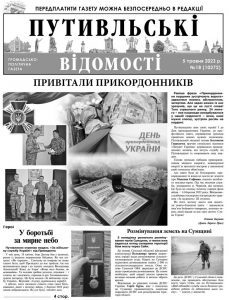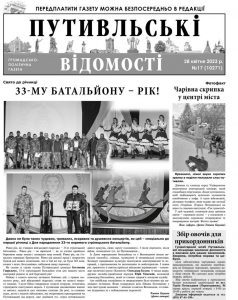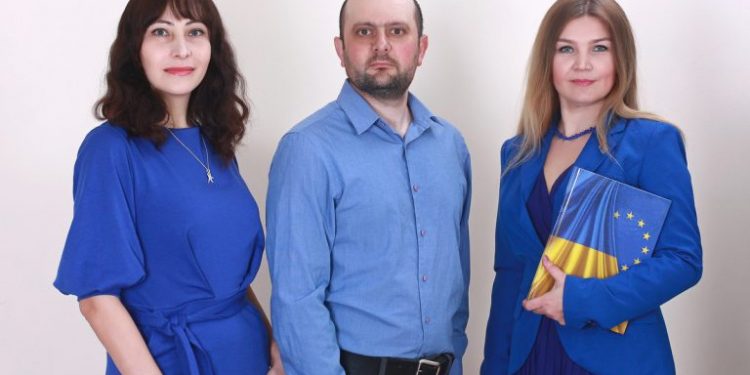The enemy was at the gates of the ancient town of Putyvl, Sumy Region, on the very first day of the large-scale invasion of Ukraine by Russian troops. Fortunately, the tank columns did not enter the town, spread out on sprawling hills with the Seim River in the lowlands; they only passed through the outskirts. There were rocket and artillery attacks, but beautiful monuments and historical complexes survived, and most importantly, people did not suffer the kind of abuse that happened in the occupied cities.
We published the newspaper using a printer and covered stories via Facebook
Enemy roadblocks were placed on the outskirts of Putyvl, blocking any opportunity to bring food, medicine, and other vital things. Of course, under such conditions, there was no question of publishing the Putyvlski Vidomosti newspaper.
However, the newsroom did not lose their minds and issued the issue in A4 format, printed it on a printer, and distributed it among the population. The editor-in-chief of Putyvlski Vidomosti Tetiana Kaushan recalls:
“Those days, at the end of February, it was essential to support and calm people down so they would not panic. I remember how the deputy editor Iryna Kupchykova then put her best effort into preparing this issue. We turned to the mayor Kostiantyn Havrylchuk, who immediately supported the idea of such a newspaper. On March 2, we printed the mayor’s address to the community’s residents, giving short information briefs. The newspaper, printed on a printer, was shared in public places, distributed in shops so people could pick it up and read it.”
Then we faced the fact that in the surrounded Putyvl, there was no place to recharge printer cartridges, and it was not possible to print even such a small newspaper. But there was communication in the town, electricity, and the Internet, and journalists began to provide vital information to the population via Facebook. We informed about the local territorial defense, how the town authorities organized the delivery of products delivered through enemy checkpoints with great difficulty (there were cases when cars with products were fired upon), gave information about where you can get free milk from farmers, etc.
We communicated while we were surrounded, and we united thanks to printing newspaper copies
All the time while being surrounded, we did not lose touch with our colleagues from Buryny, Konotop, Nedryhailov, and other communities with whom we had maintained ties since the pre-war period – when we met in Sumy during Union’s events, at training sessions and seminars. Then, being in occupation, we shared information among ourselves and discussed events and situations. And then, when there was a problem with the delivery of the copies from the printing house, the newsrooms united and solved this problem.
When the territory of the Sumy Region was liberated, the editor of Putyvlski Vidomosti, as well as her colleagues from other newsrooms, faced the question of where to print the newspaper. Kharkiv, where printing was done before the war, was actively shelled by the enemy, and there was no access to the printing house then. Then we decided to print the newspaper at the Vinnytsia printing house Press Corporation Limited, from which we had received offers for printing before and where the prices were acceptable.
But there was a problem with the delivery of the newspaper from Vinnytsia. Then several newsrooms united and agreed that all their editions would be delivered to Sumy to the sorting center of Ukrposhta by the printer’s car.
The war shortened the circulation and added problems with the post
The pre-war circulation of the newspaper was almost 3,000 copies; the newspaper was published in color щт 12 pages. During the Russian aggression, the newspaper lost almost 1,000 subscribers, and retail sales also halved.
Mrs. Tetiana says: “Maybe people didn’t like that we had a publishing break of almost two months, they were left without a newspaper. But it seems more like that many people left; many do not have enough funds for subscription, which affects the circulation.”
As in all regions, Ukrposhta demonstrated a non-partnership attitude towards the press. When the region was liberated from the enemy, newspaper printing was resumed almost immediately. And for the newspaper to start being delivered to the villages of the communities, we had to wait. The newsroom was in negotiations regarding the restoration of delivery to the farthest corners of the Putyvl district, both with local post offices and the Sumy directorate.

Not just with the money but with the hope for the best
Finding funds is not easy now as well. First, with the beginning of hostilities, many subscribers were lost, mainly those who had not a yearly subscription to the newspaper but for several months. The volume of advertising decreased significantly. We hope that, after all, the economy of the communities will stabilize, and at the same time, the advertising market will gradually recover. I would like it to happen soon.
And so far, today’s newspaper does not rely too much on agreements to cover activities. After decentralization, two communities were formed in the territory of the former Putivl district. An agreement has been concluded with the Putivl community on the coverage of activities, but the community does not have a lot of funds at the moment, so they are saving on coverage. The Nova Sloboda community prefers its own website and Facebook, and they do not agree with the newspaper at all.
The editor’s golden fund is her team
The war also affected the team. Until February 24, 2022, four journalists, a typewriter, an accountant, an advertising manager, and even… a courier worked in the newsroom. Tetiana says they had a good income from subscriptions and advertising, could afford a regular staff, and paid a decent salary. And throughout the conversation, she never gets tired of repeating that she owes all the good things that Putyvlski Vidomosti achieved exclusively to her team.
With the beginning of the Russian aggression, the team became tight with funds, so the team switched to half-rate just to save Putyvlski Vidomosti. When the printed version of the newspaper was restored after the invaders were expelled from the Sumy Region, we looked for better options for printing and further work. We did everything to ensure that the newspaper did not cease to exist.
Now one employee has evacuated, two journalists are retired, and it became difficult for them to work in the extreme conditions of the war, so they resigned. Currently, in 2023, four people work in the newsroom. They are an editor, a deputy editor, a typewriter, and an accountant. It so happened that temporarily, Tetiana Kaushan single-handedly fills eight columns of the newspaper and a feed on Facebook every week, and it must be done not just quickly but also in a way that people are interested.
There is always something to write about
Much attention is paid to information on how to avoid fake information and propaganda. Such materials are particularly useful for the border area, and Tetiana can judge this from her own experience. There were cases when, even after the de-occupation, people told her that a new offensive of Russian troops was allegedly being prepared and that the Sumy Region would be occupied. At the same time, they referred to some rumors that they allegedly read about it on social media networks.
Scientists of Sumy State University prepare materials about psychological operations at the newsroom’s request. At the same time, it is worth saying that a student of Sumy University has been doing an internship in the newsroom for several years, and the editor notes the high level of his training. Such is the business cooperation between the newspaper and the university.
The journalist tells about the consequences of the shelling and the defending heroes; people are interested in columns with information from the National Police. On the pages of the newspaper, from time to time, stories are published about the challenging work of local police officers in the difficult conditions of war.
Despite her busy schedule, Tetiana Kaushan participates in webinars and training sessions held by the National Union of Journalists of Ukraine (NUJU) and other media organizations. She tries not to miss an exciting idea that can be applied in her newsroom both today and later when life enters a peaceful lane.

Olha Voitsekhivska, Journalist of Ukraine

 THE NATIONAL UNION OF
JOURNALISTS OF UKRAINE
THE NATIONAL UNION OF
JOURNALISTS OF UKRAINE
















Discussion about this post